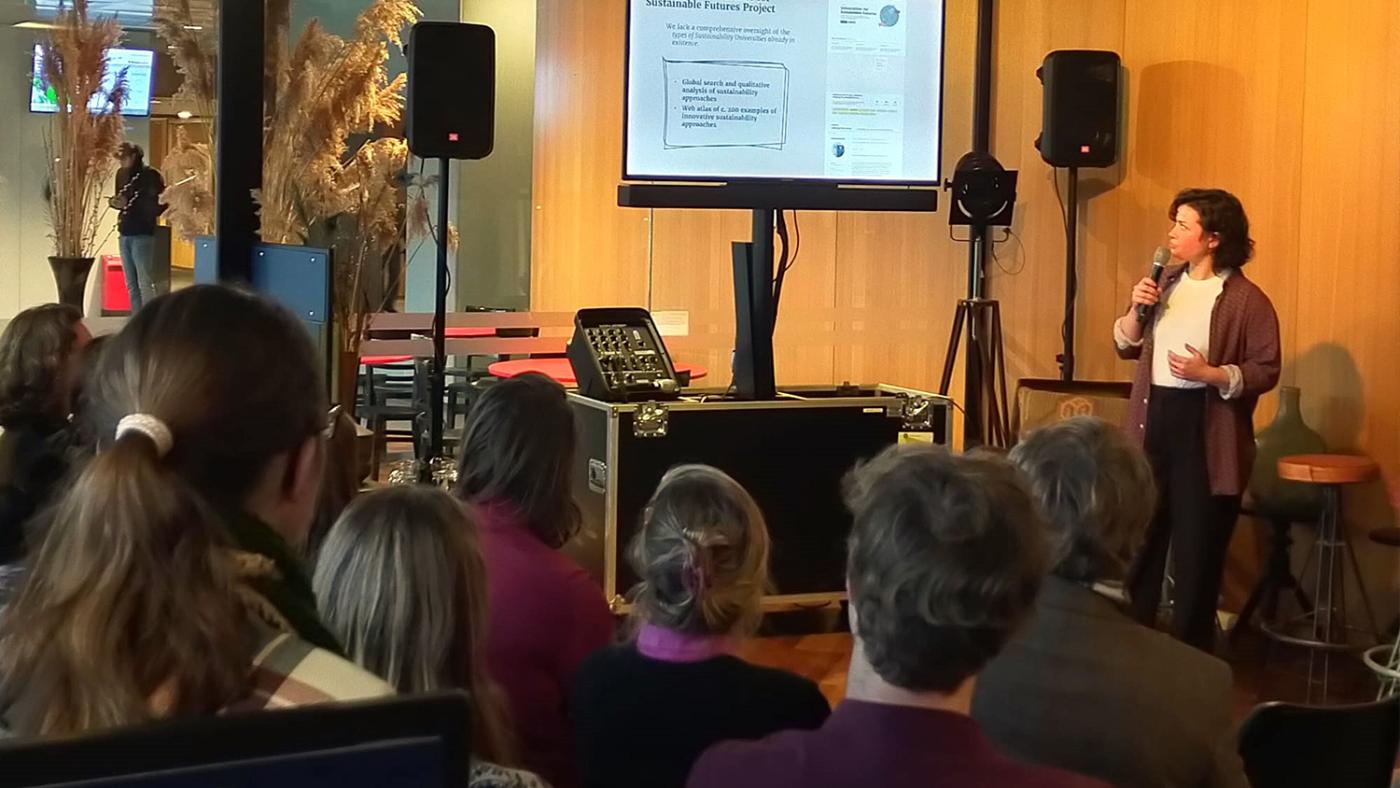Sustainability dialogue: UU as a driver of social change
UU will help society move forward in 2050 with word and deed

This is a hard time for environmentalists. More than 2,000 lobbyists from the fossil fuel industry were present at COP28 in Dubai, a fourfold increase compared to previous summits, and negotiations on the reduction of fossil fuel use are proceeding laboriously. At the national level, the winning party in the latest elections criticises scientific reports on climate change and prefers all financial support for "climate nonsense" to disappear.
Maybe that's why those who participated in the sustainability dialogue held last Thursday would like to see the university play a more prominent role by taking action. The sustainability dialogues, organised several times a year by the Pathways to Sustainability programme, aim to bring together people from different faculties and services working on sustainability. This time, more than thirty employees, teachers, and alumni gathered at Minnaert café to discuss what a sustainable Utrecht University could look like in the future.
What kind of impact does Utrecht University want to make?
The theme of this dialogue was inspired by the research conducted by the postdoctoral researcher Adèle Tufford. She is working on an atlas that includes global initiatives taken by universities around the world in the field of ecological and social sustainability. The initiatives vary greatly in form. Some universities have made social service a fixed part of the curriculum to enhance student engagement, while other universities are addressing things at the political level, establishing climate committees within local governments or having their students start agricultural businesses that contribute to keeping education affordable.
The atlas, which will be published early next year, is intended to serve as an inspiration for Utrecht University and other universities. However, many people at the university already have ideas about what needs to be done. Scientists Karin Rebel and Sebastiaan Steenman, from the Sustainability Education & Engagement community, argue for more sustainability education in the curriculum. Even though several majors, minors, and elective courses related to sustainability already exist at UU, the duo would like to make sustainability knowledge and skills part of all programmes. They argue that this is in line with UU's strategic plan.
Another notable speaker was researcher Ozan Alakavuklar, who is studying citizen initiatives aiming to bring about societal changes. In addition to advocating for more collaboration between the university and society, he raises critical questions about the buzzwords circulating about the sustainability theme. Although UU emphasises its intention to be "impactful" through research and education, he questions what kind of impact that is and who will benefit from it. He also points out that initiatives and ideas must consider tensions in contemporary science, meaning that universities and researchers are in a competitive landscape in which publications and funding are crucial elements.
But we shouldn't throw the baby out with the bathwater, says Alakavuklar. It remains essential to envision idealistic and even utopian alternatives to create a sustainable university. His presentation provided a good foundation for the activity that afternoon, where participants imagined the future of the university together.
The university should be more active in local politics
The participants split into three teams. They were tasked with thinking about Utrecht University's ethos, environment, and education in 2050, respectively. In the education team, several participants advocated for different classes. In their view, there should be more room for input coming from students' experiences, as well as the possibility to set up ad-hoc study groups. "Nice plan", said an Earth Sciences teacher, "but aren't we already suffering from a shortage of classrooms?" One participant suggested a virtual working environment but the teacher said that wouldn't be a good solution because "people are social animals. If we do everything online, some cannot keep up, and inequality arises."
Most participants agree that a sustainable university should intertwine more with society and make education more accessible. Still, some critical participants wonder if these plans fall outside the university's task package and if they require all teaching staff to speak Dutch. The team ultimately sets the problem aside and presents a concrete proposal at the end of the imagination exercise: in 2050, Utrecht University will organise publicly accessible study groups in the neighbourhoods of Utrecht.
The team focusing on the university's environment ends on a similar note, proposing to establish a centre for social services in the city. In this scenario, the university would assist with local issues such as pollution, housing, and poverty, and could even use this centre to experiment with a basic income.
The last team would like the university to take more responsibility as well. In their view, universities should engage in activism. Although universities seem to be moving in this direction (professors have been participating in protests wearing togas), the participants would like the university to play a much more prominent role. In the future envisioned by them, universities should actively engage in local politics and open community centres in the city.
Participants seem to focus more on social sustainability rather than the ecological form, envisioning a university that serves as an anchor for social and institutional change in 2050. In their opinion, this should be achieved by forming connections with governments and other organisations, educating students more critically, and putting sustainability at the centre of education and research. Researcher Adèle Tufford concludes the dialogue: "We are breaking down the ivory tower, one stone at a time."